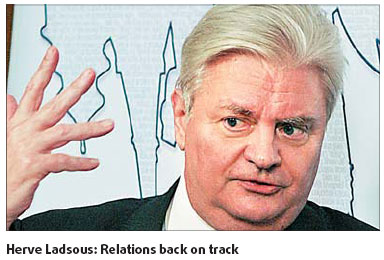Westerners need to know more about "the reality of Tibet" and the fact that it was a "slave society over 60 years ago", French Ambassador to China Herve Ladsous said in Beijing on Friday.
He reiterated that France has never supported "Tibet independence" since Beijing and Paris established diplomatic ties in 1964.

"It has been consistent with our policy that there is only one China and Tibet is an integral part of the People's Republic (of China)," Ladsous told China Daily.
Sino-French ties soured dramatically after Tibetan separatists disturbed the torch relay of the Beijing Olympics in Paris last April.
Eight months later, China suspended most contacts and called off the 11th Sino-EU summit after French President Nicolas Sarkozy met the Dalai Lama in early December.
But amid the global financial crisis, ties have started to improve.
A joint statement issued on Wednesday by the two countries reaffirmed France's opposition to "Tibet independence". Sarkozy reiterated the stance after meeting President Hu Jintao at the London G20 summit on the same day.
Ladsous said the meeting showed "very clearly" that bilateral ties are "extremely important" for both sides.
Many Western people "do not know enough about the reality of Tibet", the French ambassador noted.
"They have a sort of idealistic view of high mountains, blue skies, people immersed in a sort of spiritual dreamland," Ladsous said.
"Nobody knows it (Tibet) was a slave society," Ladsous said, noting that people in the West are generally unaware of "the history of Tibet 60 years ago" under a theocratic rule with the Dalai Lama as its supreme leader.
To better explain the reality of Tibet to the West, Ladsous suggested that "more people visit there", referring to Beijing's recent decision to re-open the region to foreign tourists since this month after a one-month ban due to security considerations.
"People-to-people exchange" is what Beijing should encourage to enhance the West's understanding of Tibet, Lian Xiangmin, a professor at the China Tibetology Research Center in Beijing, told China Daily earlier.
Foreign Minister Yang Jiechi said in early March that rejecting the Dalai Lama should be considered a "basic principle of international relations" for any country in handling its ties with China.
"China is setting a bottom line for foreign governments not to meet with the Dalai Lama, and the stance will last for quite a long time in the future," Professor Shi Yinhong of Renmin University of China said.
Ladsous suggested the relationship should progress as the financial crisis looms over the whole world.
To improve ties, several high-ranking French officials, including former prime minister Jean-Pierre Raffarin, National Assembly President Bernard Accoyer, and former presidents Jacques Chirac and Valery Giscard d'Estaing will visit China this month.
The past unhappiness was just like aircraft turbulence, but "the normal flight will resume" once the turbulence is over, Ladsous said.
Ever since diplomatic ties were established 45 years ago, Sino-French ties "have been an example of what the relationship should be between a major emerging country and a Western country," he added.
